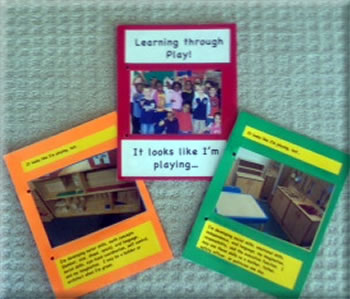WHERE CAN CHILDREN PLAY AND LEARN?
WHERE CAN CHILDREN PLAY AND LEARN?
Learning centers can provide a bridge between unstructured play and teacher directed activities.
Through “playful learning” in centers children can develop socially, emotionally, physically, and intellectually. Here is a book you can make that will help parents and administrators understand the value of center time.

It Looks Like I’m Playing But…
First, take photographs of the children engaged in the various centers in your classroom. Put a photo on each page and write a caption similar to those suggested below. Put the pages together and make a cover that says, “It Looks Like I’m Playing But…” Send the book home with a different child each day to share with their families.
Dramatic Play – It looks like I’m playing, but I’m developing social skills, emotional skills, independence, oral language, my imagination, responsibility, and the executive function. I may use these skills as a mother, father, safety officer, or politician one day.
Blocks - It looks like I’m playing, but I’m developing motor skills, math concepts (number, size, shape, space), oral language, social skills. eye-hand coordination, self control, and my imagination. I may be a builder or architect when I’m grown.
Art – It looks like I’m playing, but I’m developing my creativity, small motor skills, problem solving, sharing, cooperation, independence, and responsibility. I may use these skills as an artist, illustrator, or designer one day.
Math - It looks like I’m playing, but I’m developing oral language, social skills, small motor skills, concepts about quantity, shape, size, pattern, and an interest in math. I may use these tools as a computer programmer, accountant, or mathematician in the future.
Library - It looks like I’m playing, but I’m developing alphabet knowledge, oral language, print knowledge, listening skills, eye-hand coordination, concepts about the world, and the desire to read. Maybe I’ll be a publisher, author, or librarian when I grow up.
Science - It looks like I’m playing, but I’m developing a curiosity about the world, sensory skills, problem solving, language skills, and experience with the scientific process (observing, predicting, experimenting, recording, reporting). If I’m a doctor, lab technician, pharmacist, or landscaper I will utilize these skills.
Table Toys - It looks like I’m playing, but I’m developing small muscles, eye-hand coordination, attention span, social skills, and concepts about size, shape, color, pattern.
I might use these skills as a chef or dentist one day.
Language – It looks like I’m playing, but I’m developing oral language, alphabet knowledge, print connections, phonological awareness, visual skills, book knowledge, phonics, and the motivation to read. No matter what I become when I grow it, it will be important to know how to read.
Writing - It looks like I’m playing, but I’m developing eye-hand coordination, small motor skills, alphabet knowledge, self confidence, vocabulary, and an interest in print.
I might use these skills one day as a journalist, administrative assistant, or poet.
*You can also use the suggested skills that children develop on center signs in your classroom.
